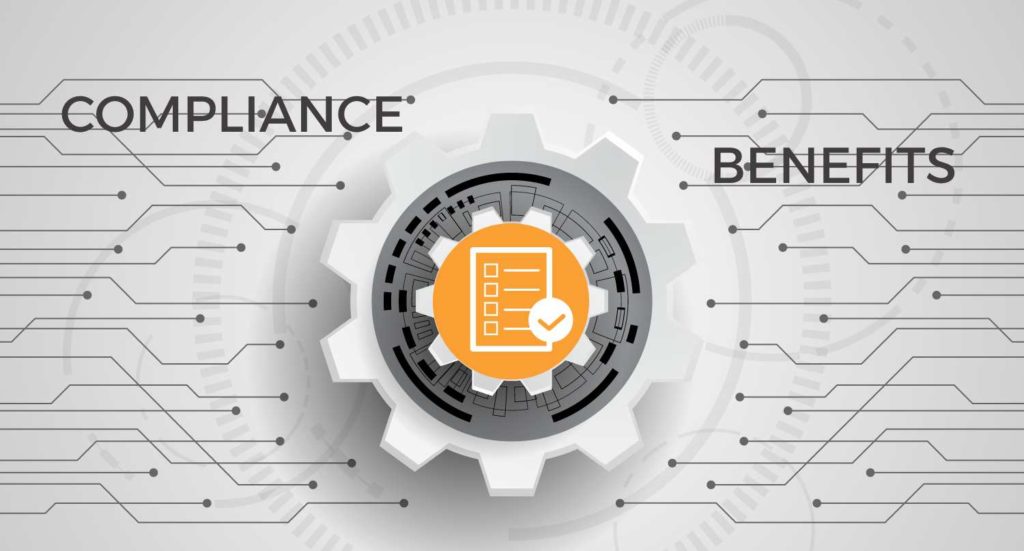
One of the primary benefits of a compliance program is ensuring you operate within legal boundaries and mitigate potential risks or penalties. The advantages of using compliance software is the ability to become fully compliant with industry regulations and standards.
Compliance management is necessary regardless of the type of business you operate. You risk getting shut down or fined if you can’t ensure your company fails to comply with regulatory standards. Most people say they must maintain compliance, but few describe how to do it. Hence, many companies treat compliance management like a “check-the-box” exercise.You may end up harming your company in the long run if you approach compliance management this way. Thus, investing in a compliance management system is crucial. Legal compliance management software can be an effective tool for companies to maintain compliance and avoid costly penalties.
The Benefits of a Compliance Program for Your Business
One of the primary benefits of a compliance program is ensuring you operate within legal boundaries and mitigate potential risks or penalties. The advantages of using compliance software is the ability to become fully compliant with industry regulations and standards.
Compliance management is necessary regardless of the type of business you operate. You risk getting shut down or fined if you can’t ensure your company fails to comply with regulatory standards. Most people say they must maintain compliance, but few describe how to do it. Hence, many companies treat compliance management like a “check-the-box” exercise.You may end up harming your company in the long run if you approach compliance management this way. Thus, investing in a compliance management system is crucial. Legal compliance management software can be an effective tool for companies to maintain compliance and avoid costly penalties.
What are the Advantages of Legal Compliance Management Software?
There are several advantages to implementing legal compliance management software to manage your compliance requirements. Here are a few of them.
Organizes All Your Compliance Requirements in One Place

The importance of a compliance program is that it integrates regulatory and business requirements into a unified framework, streamlining compliance tracking and task management while ensuring adherence to requirements. Furthermore, a centralized solution fosters collaboration between departments and prevents the formation of silos around compliance tasks.
Facilitates Collaboration
Task assignment and reassignment are easy using compliance management software. Users can update their status, share documents, and exchange comments all in one place. It eliminates scattered compliance information and prevents confusion caused by multiple versions of the same document. The result is a streamlined process that saves time and ensures everyone has the necessary information.
Improves Visibility into Compliance Performance
Legal compliance management software allows managers and administrators to monitor compliance levels and performance throughout the organization using custom drill-down reports and real-time dashboards. These features provide greater visibility into the status and performance of compliance efforts.
Automates the Compliance Process
Ensuring compliance involves repetitive and time-consuming tasks that are prone to human error. Compliance management software automates these tasks, including task scheduling and compliance monitoring. The benefits of a compliance program are undeniable, it helps organizations become more agile, efficient, and accurate. You can focus on more important matters by putting resources to better use.
Tracks Regulatory Changes More Easily
Keeping up with regulations is difficult due to frequent updates. To stay current, one must read and apply changes. A compliance management solution solves all this by tracking internal and external regulatory changes and identifying non-compliant procedures. Another advantage of a legal compliance management software is that it also helps map new regulations and standards onto operations.
Saves Money on Operational Costs

Compliance software automates compliance monitoring and eliminates the need for investing in more personnel and resources. It also proactively tracks regulatory changes and flags risks before they hurt you financially. Moreover, automation also reduces the chances of human error and oversight that may lead to fines and penalties down the road.
Creates a Business Roadmap
An effective compliance management system can guide you in the right direction. It highlights where you must improve by mapping your regulatory requirements. As a result, you can effectively plan your organization’s compliance activities.
Provides a Better Customer Experience
Implementing a compliance risk management solution not only ensures adherence to regulations but also showcases your dedication to enhancing your systems and processes for the benefit of your customers. It instills trust in your organization and fosters customer loyalty, increasing business.
What are the Disadvantages of Legal Compliance Management Software?
One of the disadvantages of a legal compliance management software can be its complexity. Some software can be complex and difficult to use, particularly for individuals who are not familiar with the legal compliance field. This can lead to errors, frustration, and decreased efficiency.
Become Compliant with Nimonik
With Nimonik, you get a comprehensive and easy-to-use platform that helps you stay on top of compliance requirements and meet all necessary regulations and standards. Here are some ways Nimonik can help.
- Conduct audits using over 2,000 free audit templates based on standards and best practices
- Customize your audit template and easily share it with everyone in the organization
- Schedule audits and assign action items to ensure timely completion
- Rank risk obligations and prioritize them based on their importance
- Monitor compliance performance with real-time dashboards
- Generate reports in PDF, CSV, and Word formats to share with stakeholders
FAQs about compliance management benefits
What are the benefits of implementing a compliance program?
One of the key benefits of a compliance program is that it can help the organization avoid legal and financial penalties for non-compliance with laws, regulations, and industry standards. Organizations can use compliance programs to proactively identify and address potential compliance risks, build a positive reputation, and increase customer trust.
How can a compliance program help businesses save money in the long run?
Non-compliance with regulations can result in hefty penalties that can cripple a business financially. Companies can avoid these fines and penalties by adhering to all relevant regulations and laws by implementing a compliance program.
What are the potential consequences of not having a compliance program?
The potential consequences of not having a compliance program include legal and financial penalties, loss of reputation, and even criminal charges. Similarly, non-compliance with anti-corruption laws can lead to criminal charges and a damaged reputation.
What are the key elements of a successful compliance program?
Several key elements are essential for a successful compliance program. These include:
- A strong culture of compliance
- Written policies and procedures
- Regular risk assessments
- Effective communication and training
- Monitoring and reporting
- Enforcement and discipline
- Continuous improvement
How can businesses tailor their compliance program to their unique industry and business model?
Customizing a compliance program to fit a specific industry and business model is essential to guarantee its efficiency and appropriateness. Use these guidelines to tailor your program:
- Identify relevant regulations and standards
- Understand the risks specific to your industry and business model
- Develop policies and procedures tailored to your organization
- Create compliance culture and empower employees through training programs
- Monitor compliance performance, track progress, and report any issues
- Regularly review and update the compliance program
How can compliance software help small businesses stay up-to-date with changing regulations?
Compliance software is helpful for small businesses to stay informed about evolving regulations. Here are several ways that compliance software can help.
- Automated compliance updates
- Centralized database
- Real-time monitoring
- Customizable compliance checklists
- Document management
- Compliance reporting
What role do technology and automation play in compliance software?
Manual data collection, analysis, and reporting are prone to human errors and can be time-consuming. Compliance software can automate these processes, ensuring accuracy and efficiency and reducing costs. Additionally, automation allows compliance officers to focus on more complex tasks.
How can a compliance program help businesses maintain a competitive edge in the market?
A well-designed and implemented compliance program can help businesses maintain a competitive advantage in several ways, such as the following.
- Enhanced reputation – a robust compliance program can help businesses build a positive reputation in the marketplace by demonstrating their commitment to ethical behavior and compliance with laws and regulations.
- Improved risk management – compliance programs can help organizations identify and mitigate legal and regulatory risks and reputational and operational risks.
- Increased operational efficiency – automating compliance processes reduces the time and resources needed for compliance management, allowing businesses to prioritize their core activities and gain an edge over competitors.
- Attracting investors – strong compliance programs can attract more businesses due to their association with good governance and effective risk management.
How can small businesses balance the cost and benefits of implementing a compliance program?
The associated cost of implementing a compliance program can deter small businesses from investing in one. On the other hand, not investing in a compliance program can result in costly fines and penalties.
The following are some tips for balancing compliance costs and benefits:
- Appoint a compliance officer or committee – for small companies without the means to hire a dedicated compliance officer, assigning one individual with ultimate responsibility for compliance may suffice. Alternatively, establishing a committee to manage organizational compliance is another possible solution.
- Assess your risk exposure – a collaboration between management and compliance officials is necessary to pinpoint high-risk areas relevant to the business, allowing for consistent monitoring, auditing, and evaluation.
- Establish procedures and standards – a good compliance program has basic standards and guidelines, like a written Code of Conduct, background checks, record retention policy, and strategies for dealing with misconduct.
- Implement reporting procedures – establishing a third-party reporting hotline in the workplace is recommended to promote safety and transparency, allowing employees to report misconduct without the risk of retaliation or negative consequences.
- Conduct training and education – small companies should regularly educate and train employees on compliance. Top management should introduce the program and provide updates through refresher meetings.
What are the future trends and developments in compliance programs should small businesses be aware of?
The risk and compliance landscape is rapidly changing as regulators seek to protect consumers when they bank, shop, and invest. Here are some trends that small businesses should keep an eye on.
- Continued digitization – Many organizations are transitioning from using Excel spreadsheets to digitizing compliance training data. While the process may be challenging, it can increase compliance programs’ efficiency and scalability. Digitization allows organizations to reach more individuals with training in a flexible manner.
- Regulation of Cryptocurrency – Cryptocurrency is currently unregulated and associated with money laundering, prompting governments to explore ways to improve regulations and increase user safety.
- Integration of ESG in compliance training programs – Environmental, Social, and Corporate Governance (ESG) initiatives are shifting from voluntary to regulated practices in the US and Europe. It has increased the need for businesses to adopt a focused approach toward ESG.
Ethical concerns surrounding artificial intelligence (AI) – The increasing use of predictive analytics, automated systems, and digital avatars improves AI capabilities in global industries. Compliance officers must consider AI ethics due to the rising dependence on AI.







